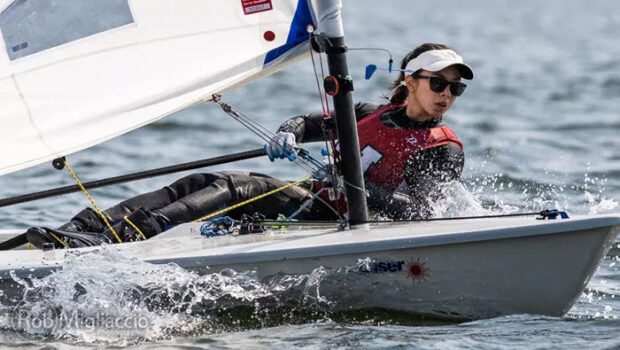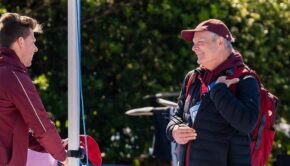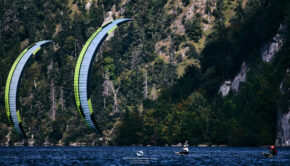Too hard to balance everything
Published on October 2nd, 2024
When it comes to Olympic Sailing in the USA, many of the elite youth sailors are also drawn toward competing collegiately, and either try to balance both college and Olympic sailing, or postpone their Olympic campaigns until after graduation.
But success at the Olympic level requires an early commitment and a dedicated focus, and while continuing with education is doable, college sailing presents a conflict. Harvard’s Sophia Montgomery, who represented Thailand at the Paris 2024 Olympic Games, finishing 27th our of 43, shares her story:
On the journey to Team Thailand and the Paris Olympic Games:
I sailed my first two years with Harvard, but college sailing and Olympic sailing are quite different. Different boats, different rules. Basically, nothing is the same and so I got very little practice in the ILCA 6, which is what I would compete in if I wanted to try.
I decided in my junior year that if I actually wanted to give it a shot, because I thought it was kind of a coin toss, but if I wanted it to ever land in my favor, I needed to actually sacrifice the time and put in the work because my progress was pretty stagnant.
Being in college, it was hard to balance everything and move to a different country and all of that. So, I took a step back from school for a year. At first it was just for a semester, and then I was just going to try my best and see if I could qualify.
And it worked. I was very surprised, but it worked, and then I took the rest of the year off to go to the Games.
On where Montgomery sailed during her time away from campus:
Qualifying was at my home club in Thailand. I was really lucky in that at first, I did the regular Summer Europe tour because that’s where all the championships are. And then I had the Asian Games in China, where I sailed awfully. It was stressful and I had unrealistic expectations.
But then we kind of recuperated at home and I had two months of training with my coach. We worked together for two months, came every day on the water where we would race. And I guess we really pulled it together in time.
On when Montgomery thought the Olympics were a realistic goal:
I was always in the mindset that I could do anything, but how realistic that was? I choose not to think about it. And I was just, like, we’re here. If it doesn’t work, I’ll figure it out after. But I was just, like, this has got to happen.
And actually, I only felt like I peaked or felt like, maybe I was right this whole time like the week before we raced. Before that, I was like, this is going not so well, this is going poorly every single week. The week before we raced, I peaked for the first time and I was like, maybe I can do it.
On how Montgomery felt after qualifying for the Olympics at her home club:
Just gratitude. I went around crying and hugging everyone. It was amazing because my first-ever time sailing, my first-ever regatta, my first-ever everything was on the same waters I qualified for the Olympics.
And so, I knew everyone there, all the staff there were basically my aunts and my uncles, and my actual family was there. Also, my coaches, all of my childhood coaches were there. It was amazing to come back up and just everyone be there. I was super thankful. I was just going around hugging people. It was amazing.
On what it was like once Montgomery arrived in Paris:
Sailing was in Marseille and I went to Marseille a month before, so I was there since June. It was just to get used to the waters because sailing is very weather dependent. To get used to the wind and the waters, we went very early.
It didn’t really feel like the Olympic experience until we really moved into the village. I was so excited. I was so happy. It was amazing. And we also didn’t have the cardboard beds. We stayed in this hotel that they changed to be the village. And I was a girl, so I got a room to myself. I got a queen bed, sea view. It was amazing and I was so, so happy.
But I think I really got lost in the Olympic haze. After about three days and I felt myself, like, you lose focus of what you’re actually doing and you’re kind of living this dream. So, I packed all the free stuff they gave us into a suitcase and I shoved it into a corner of the room.
On how Montgomery prepared while in France:
It was the same as when I was preparing to qualify. It was just 100 percent sailing, like sailing, gym, sailing, run, sailing, talk about sailing, watch sailing. And then the off days I really took off. You know, I explored France, but when we were on, it was just try to make my life as much sailing as possible just to really love the sport again. Just engulf yourself in it.
If we consider how much time I had on the water, like experience-wise and everything compared to these other women, I was making up for so much lost time, especially with going to school. And I was one of the youngest in the fleet.
So, I was just really trying to pull myself together. At least I knew I wasn’t going to win, but I wanted to be part of it. I didn’t want to go as a background character, and I just wanted to show some good sailing. That’s what I was trying to do.
On sailing in Marseille and the challenges Montgomery faced:
Marseille is really special in that I think the wind conditions vary so much. I was really proud of all the work. I am proud of all the work that I had done this year.
I really felt like I had improved a lot as a sailor, and I really wanted to show the people that I loved that, and I knew they would be tuning in. I was going in with a lot of nerves, and I definitely felt that on the first few races. I wasn’t sailing like myself.
And then I ended up getting really frustrated on the second day because I was making really dumb mistakes, things that when I started this gap year would have made, but something I felt pride in knowing that I didn’t do those things anymore, and I was doing them again.
It really took on the third day; the Mistral had come in. It was really windy and I was a little bit scared because Asian sailors aren’t the strongest in strong wind. But I improved and I actually rounded OK, around 17th, which is better than what I had finished.
But then I put my sunglasses on my cap and a wave knocked them over. My sunglasses, my favorite Oakleys, I watched them drown, sink to the bottom of the Marseille Bay. I was so angry that I lost it. I was out of my mind and I wasn’t paying attention to anything and then a gust hit my boat and I capsized. I flipped and was like, not in the Olympics. I lost maybe 15, 20 boats on a single leg of the race and with blind rage, pulled the boat back out. I think I passed those 15 boats for the rest of the race.
I kind of just let go. I guess my Oakleys sacrificed for something, and then I sailed really well for the next five races. I really miss them still, but I kind of let go of the nerves and just the pressure not even to win, but just to perform, to make other people not disappointed in me.
The nerves got back to me on the last day when (the competition was being live streamed) and you could hear the helicopter and the drones. It was really difficult conditions. I should have had a better head on my shoulders, but I couldn’t figure it out for the life of me.
The last race, it was a sour note to end on, but yeah, I had a good race. I had a black flag, which I’ve never had before in my life, which I was really angry about that as well, but at least it shows I was pushing the line. I was really trying to stand with the good girls and I’m proud of it.
On the one memory Montgomery will remember:
There are so many. I don’t know, I think that the moment that changed me the most was definitely the strong wind day. So many things happened on this date. The winner, the Netherlands woman, she was my very first sailing idol. She won a medal before I started sailing. And so, I had lost my cap and sunglasses, eating saltwater. And we did three races on this strong wind day.
I’m eating saltwater and sun and everything, and I’m crying as I sail because there’s is so much saltwater in my eyes; everything’s running. I’m trying to take it off and then my face starts getting burned because I’ve rubbed all the sunscreen off my face and I’m getting burnt. … I was just suffering in the trenches. On the start line, I couldn’t open my eyes.
Then I look over and the Netherlands woman is the only other person in the entire fleet to also have lost her cap at or at least she had nothing else on her face. Other people had glasses or a cap or both. It was me and her who had nothing to protect us from the weather.
I was like, you know, if she could do it, I could do it. So, I forced myself to open my eyes to the next one, and it was my second-best race. I rounded the top mark eighth and I was like, maybe I can do it, you know?
Los Angeles 2028 Olympic Sailing Program*:
Men’s One Person Dinghy – ILCA 7
Women’s One Person Dinghy – ILCA 6
Mixed Two Person Dinghy – 470
Men’s Skiff – 49er
Women’s Skiff – 49erFX
Men’s Kiteboard – Formula Kite Class
Women’s Kiteboard – Formula Kite Class
Men’s Windsurfing – iQFOiL
Women’s Windsurfing – iQFOiL
Mixed Multihull – Nacra 17
Venue: Long Beach, CA
Dates: July 21-August 6
* World Sailing voted to keep the Paris 2024 Sailing Program for Los Angeles 2028, but the program is not final until the IOC approves all events, which usually occurs between December 2024 and January 2025. At that time, the IOC will also confirm the quota for sailing and how many medals.









 We’ll keep your information safe.
We’ll keep your information safe.